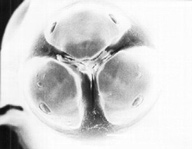Roundworms
 What are roundworms?
What are roundworms?
Roundworms describes a whole bunch of different worm parasites. The most common dog roundworm is Toxocara canis. Humans have a different roundworm, as do cats, horses, pigs, and other animals. Dogs get roundworms either from eating worm eggs off the ground or because the mother dog was infected and passed the worms to her puppies during her pregnancy. Adult roundworms have a funny face, with three big lips surrounding their mouth. They feed on partially digested food in the dogs intestine.
Although the risk to humans is slight, roundworm is a major health concern. Roundworm lives in the small intestine of dogs. It is a microscopic and parasitic organism. Eggs are passed into the environment in the dog's waste. The eggs then take two weeks to a month to become infective.
There is no risk from fresh dog waste. But after becoming infective, eggs can remain in the soil for several years. Humans do not develop adult roundworms, although migration of larvae through tissues and organs can cause disease. Humans usually become infected through contact with eggs in the soil or by accidental ingestion.
Direct contact between infected dogs and humans is not considered to play a role in the transmission of roundworm. Young children are at the greatest risk. They often eat dirt and grass and fill their mouths with contaminated hands. Hand powered wheel chair users and field sports players also face greater risks.
Roundworm is not present in dogs that receive regular worm treatments. Picking up dog waste before roundworm eggs can become infective is equally important.
Return to Articles